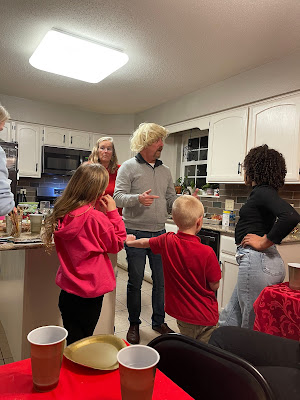This past week, people loved by God, we celebrated together the what of Christmas and the Who: the events around the birth of the holy Child. This past week we heard the angel’s message and the host of heaven sing their song. This past week we saw the shepherds hurry to Bethlehem to see this thing which had come to pass, the Babe lying in a manger. This past week we gazed in awe at the little one and said to one another: “This is Jesus Christ, true God, begotten of the Father from eternity and also true man, born of the Virgin Mary.” So we celebrated the what of Christmas and the who. What? A Savior is born. Who is He? Christ the Lord, true God and true Man.
This morning, however, St. Paul invites us to go even further. To go beyond the what and the who and to rejoice in the why. The why of the what. The why of the Who. Why did all that happen in Bethlehem so long ago? Why did the Son of God become a little child? Here’s the simple yet profound answer Paul gives: Galatians 4:4-5 (ESV) 4 But when the fullness of time had come, God sent forth his Son, born of woman, born under the law, 5 to redeem those who were under the law, so that we might receive adoption as sons. Behold the why of Christ’s coming! He came that we might be adopted and received by God the Father as His own children. He came that we might have a place in the heavenly Father’s home forever. He become a child of man to make the lost children of men into the true children of God! Behold, the why!
St. Paul sets slaves in opposition to children. For that is the rock bottom reality of life. Either you are a slave under the law or you are living in the freedom of the children of God—the freedom Christ came to give. The thing about slaves is that they don’t have a permanent place in the house. They work for hire. They know that their position in the household depends solely on their performance of the duties assigned them. If they fail to perform, out they go. They have no permanent place in the house, and so their lives tend to be eaten up with anxiety about their standing.
How different the situation of children! They know that their place in the house is utterly secure. They have no fear of being tossed out. They belong there. It’s their home. They stand in a totally different relationship with the master of the house than the slave does. Nothing shows the difference better than what they call the same person. A slave calls the Lord of the manor, Master. But what does a child call the Lord of the manor? He calls him daddy.
“And because you are sons God has sent forth the Spirit of His Son into your hearts, crying out, ‘Abba! Father!’” Abba is the daddy or papa word in Aramaic. It is peculiarly Jesus’ own term of address for the heavenly Father. For you see what happened, don’t you? Jesus Christ came into this world to give us nothing less than His own relationship with His Father. As He was the beloved Son of the Father, so He calls us into such a relationship with Him that we might be called and be “beloved children of the Father.” And children call out to their dear Father with all confidence, “Abba!”
From the Catechism: “Our Father who art in heaven. What does this mean? With these words God tenderly invites us to believe that He is our true Father and that we are His true children so that with all boldness and confidence we may ask Him as dear children ask their dear Father.”
We’d never dare to pray like that unless Jesus had invited us to. And the “our” there is to be noted. Our Father. He gets to be “ours” —that is, yours and mine—only because Jesus shares Him with us. Gives Him us as our own. Do you remember the scene after the Resurrection when Jesus appeared to Mary Magdalene as she wept outside the tomb? Jesus gave her some awesome news. “Go to my brothers and say to them, I am ascending to My Father and your Father, to my God and your God.” He can send them this news on the basis of what He has accomplished on Calvary and sealed in His resurrection. He has made His Father ours!
Our hymn of the day originally put this most powerfully: Er wechselt mit uns wunderlich / unser Fleisch und Blut nimmt an / Und gibt uns in sein Vater’s reich / die klare Gottheit d’ran / die klare Gottheit d’ran. He changes with us wondrously, our flesh and blood takes on, to give us in His Father’s realm the luminous divinity.
But how does He give the benefit of that to us? We know that He came to make us the children of God. But how does He accomplish this in our lives? If we were reading straight through Galatians we would already know, for Paul has just made it clear in the verses right before our second reading: “For you are all sons of God through faith in Christ Jesus. For as many of you as were baptized into Christ have put on Christ.” (Gal. 3:26, 27)
Baptism! That is how Christ makes us children and heirs of His Father. Now you know why Christ said: “You must be born again.” We need a new birth to free us from slavery, free us from the uncertainty of our place in the household, free us from the idea that we have to earn our keep. So christ gives Baptism to us. In the water we are given a new birth. In the water we are adopted by god as His own children. In the washing of water with the Word, the Holy Spirit Himself is given to us, the Spirit who cries out “Abba, Father!” The Spirit bears witness with our spirit that we are the children of God and heirs with Christ.
Of course Baptism only benefits those who believe. That makes sense, doesn’t it? Look, Baptism promises you an eternal inheritance. It makes you a child of God and gives you a place in the Father’s house for all eternity. But only as you believe.
Think of it like this. One day you get a letter in the mail from a lawyer who told you that your great Aunt Mathilde (whom you never knew about) has died and left you her entire estate worth, let’s say, 30 million dollars. What good would that estate do you if you tore up the letter and said: “Nope. This is some scam and I’m not going to fall for it. This is just some way to get me to spend my own money.” By not believing the inheritance was yours, you could live and die a pauper, when in fact you were a multimillionaire. And how sad that would be! To reap Baptism’s benefits the promises God makes you in that water must be believed. Sad to say, there are many baptismal millionaires, children and heirs of the heavenly Father, who live and die as slaves and never once in time or eternity enjoy what their baptism most surely bestowed upon them.
What utter joy would fill our hearts if we always kept this in mind at all times. If we woke up every morning and said: “Father in heaven, thank you for making me your child in Baptism.” If we went to bed every night certain that our sins had all been forgiven through Jesus’ blood and that our bodies and souls were secure in His care and keeping. It was to keep such joy front and center that Dr. Luther wrote his suggestions for morning and evening prayer. That’s why he bids you begin with the sign of the holy cross (for you now belong to Christ the Crucified) and to say the words of our baptism. That is why he teaches us to pray every morning and every night: “I thank you, my heavenly Father, through Jesus Christ.”
Children and heirs. That is what Christ makes us in Baptism. That is the life which He calls us to as His brothers and sisters. It was to give us this priceless gift that He came among us. For this He was born at Bethlehem. That we might walk all our days in this life in the joy of having a heavenly Father and an eternal home and “an inheritance incorruptible and undefiled and that does not fade away, kept in heaven for us.” (1 Peter 1:4)
P.S. Pastor Mark Preus offered this absolutely inspired “fix” to the problematic stanza in LSB:
A wondrous change with Him we share:
Our flesh and blood takes He,
And bids us in God’s kingdom wear
His bright divinity.
His bright divinity.





















